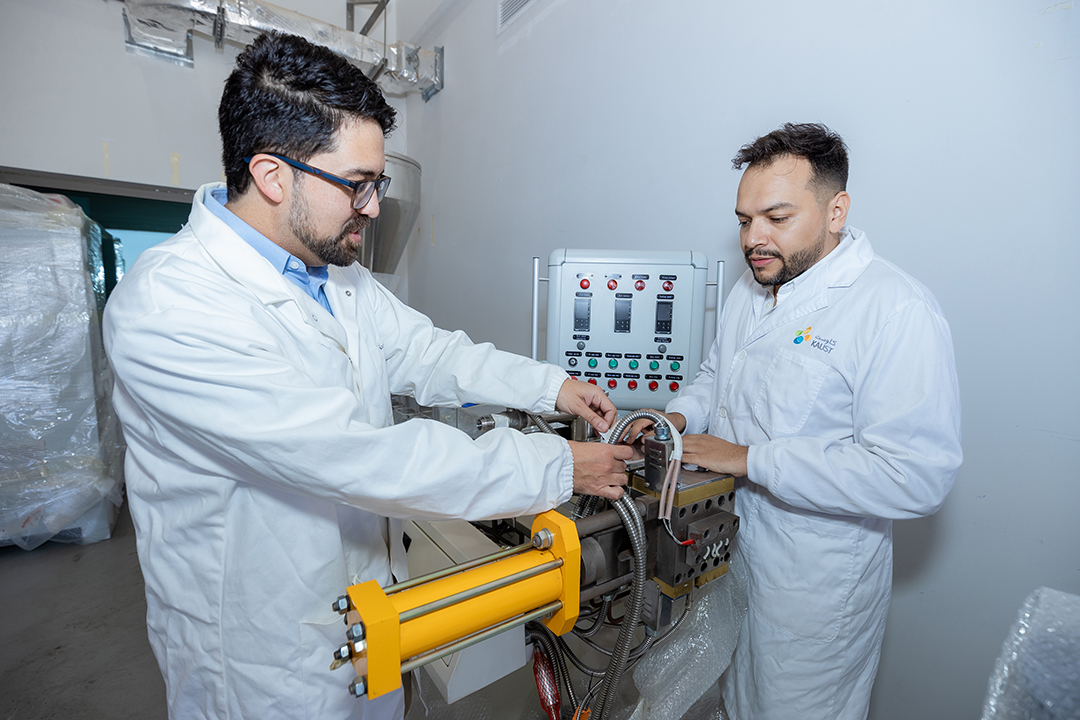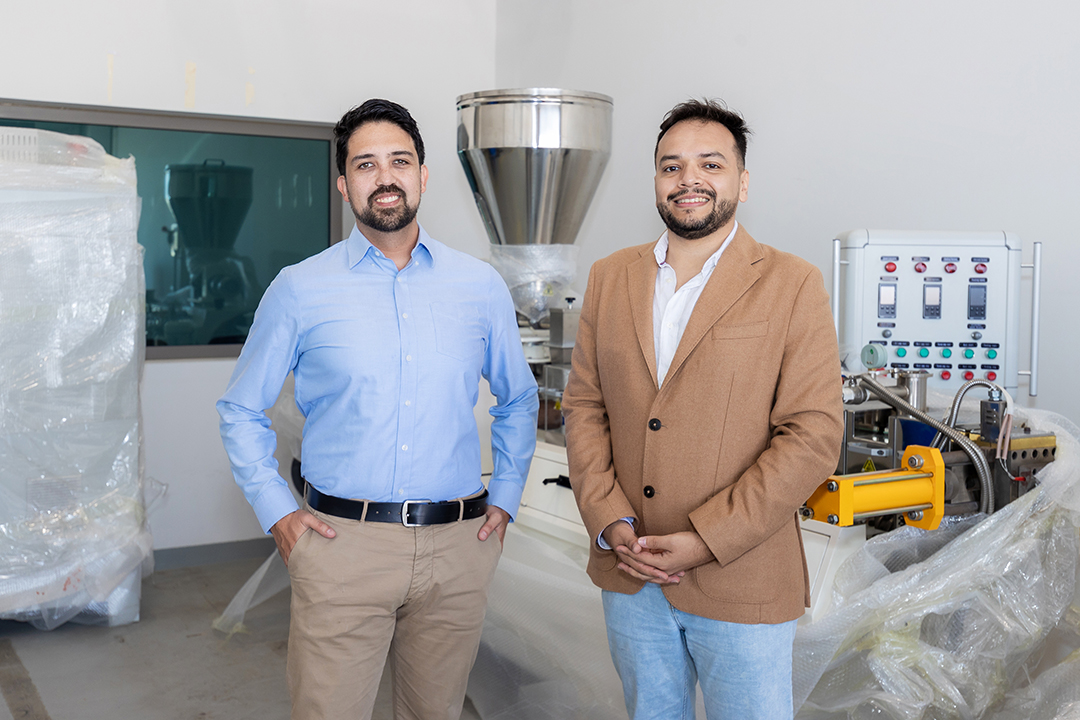Turning date waste into ‘green’ plastic: KAUST startup Polymeron champions circular economy

Polymeron co-founders Martin Ibarra, left, and Rodrigo Jimenez tinker with their new extruder — the milestone first instrument of their KAUST startup’s R&D pilot manufacturing plant.
KAUST startup Polymeron is transforming agricultural waste into high-performance biodegradable plastics, advancing the Kingdom’s national priorities in sustainability and innovation. By upcycling date byproducts — a hallmark of Saudi agriculture — and expanding into processing waste from the poultry sector, the company is helping shape a circular economy built on local resources.
“One of the goals of Saudi Vision 2030 is to diversify the economy beyond oil,” said Rodrigo Jiménez Sandoval, co-founder and chief executive officer. Polymeron is following a business model that is sustainable and aligned to a waste-to-value strategy, with plans to repurpose about 20,000 tons of waste per year. “Through our company, we’re contributing to this effort by establishing a new industry in the Kingdom — a biodegradable plastics industry.”
Polymeron will create jobs for Saudi talent in the fields of polymers, manufacturing, and sales, he added, while simultaneously providing new revenue streams for local farms and small factories. “Even more, Polymeron is entering into a market that was valued at US$13 billion in 2024 and is expected to grow 20 percent each year until 2029 to achieve a value of US$34 billion.”
This global market is increasingly seen as a pillar of sustainable manufacturing and economic diversification, particularly across the MENA region. By sourcing raw materials from local farms and collaborating with Saudi manufacturing partners, Polymeron is helping build a circular, waste-to-value ecosystem rooted in the Kingdom.

Polymeron co-founders Martin Ibarra, left, and Rodrigo Jimenez are transforming date and poultry waste into biodegradable plastics through their KAUST startup.
Jiménez came to KAUST in 2012 from Mexico for a master’s in environmental science and engineering, later pursuing a Ph.D. While at KAUST, he developed a keen interest in biotechnology and the environment, leading him and co-founder Martin Ibarra to launch Polymeron to address plastic pollution and agricultural waste through sustainable innovation.
“In Saudi Arabia, there are a lot of waste streams. We decided to tackle plastic pollution and reduce waste, as the country consumes a large amount of plastic. And what better combination than taking date waste and transforming it into plastic? That’s basically how we started the company — the inspiration behind it.”
Polymeron is currently building its pilot plant at KAUST and has already purchased key equipment, with support from the National Technology Development Program (NTDP)’s NextEra program, which offers financial incentives to eligible tech companies to accelerate the development of advanced technologies.
For large-scale production, Polymeron’s eight-person team is testing materials with a Saudi industrial partner. Polymeron is in the pre-sales phase and is completing laboratory testing, with hopes to begin mass manufacturing before the end of the year, selling the product to Saudi clients and expanding into global markets.
“For us, it’s important to be at KAUST because one of the core activities of the company is R&D. If we don’t have R&D, then we don’t have innovation and we don’t have products or technology to sell. At KAUST, we can have access to these resources. That’s very important for us to develop our technology.”
Deep impact
The company has gained widespread recognition, winning the TAQADAM Startup Accelerator Program in 2021 and the US$1 million Omnipreneurship Award in 2022. In February of this year, Polymeron hosted a booth at LEAP 2025 in Riyadh. The Research, Development and Innovation Authority also invited Polymeron to attend COP16.
These milestones underscore the startup’s emergence as a regional leader in clean materials innovation that attracts investment.
Both SABIC and Tanmiah Food Company have been valuable partners in helping the KAUST startup achieve success, noted Jiménez. Its materials can be processed using standard plastic extruders, injectors, and film-blowing machines while avoiding the generation of microplastic pollution.
Polymeron is already pursuing opportunities in Saudi Arabia, actively seeking global partnerships to commercialize its biomaterials. Jiménez said: “We’ve been receiving interest from many parts of the world.”
In Saudi Arabia, he noted, KAUST plays a significant role in enabling deep-tech entrepreneurship, providing essential infrastructure and R&D support to help transform lab research into scalable market solutions. The University’s strategic emphasis on both startup development and technological advancement helps propel the success of emerging companies such as Polymeron.
The process
With a strong commitment to sustainability, Polymeron aims to achieve profitability through its patented process, focusing on efficient and actionable innovations for the Kingdom. Jiménez said: “In general, we use physical methods to transform the wastes into materials suitable for using with other biodegradable materials.”
The company utilizes agro-industrial date waste to create bio-carbon-based materials, transforming such organic matter from Saudi industries to produce “green” plastic items, including agricultural mulches that do not contribute to microplastic pollution. Polymeron aims to be a leader in biopolymer and biomaterial innovation in the MENA region by advancing the use of renewable resources and alternative raw materials.
“We take the date waste and transform it into a very fine powder to use as feedstock,” the CEO added. “Then we mix it with other biodegradable materials, which act as a matrix for the base powder. Through processing technology, we create plastic pellets for single-use applications.”
Among its many issues, plastic waste contaminates the food sources of fish and contributes to broader environmental harm — challenges Polymeron’s biodegradable plastics aim to address. The company began working with chicken waste as part of its Omnipreneurship proposal. For that competition, the team developed a revised process using chicken waste to produce biodegradable single-use plastic products, Jiménez said.
“Our chicken waste formulations are used for items such as bags, while the date waste formulations are more suited for spoons and similar products.”
Future opportunities
While date and chicken waste have been the focus so far, Jiménez said Polymeron will expand into other types of agricultural or industrial waste in the future. Most agricultural waste can be used for this purpose, although factors such as quantity, location, and processing ease determine biodegradable plastic suitability. “As agricultural waste amounts globally to one billion tons per year, it’s necessary to repurpose it and give it an alternative use like we do.”
As Polymeron prepares to scale up and expand into Saudi and global markets, he noted, the company remains focused on enforcement of biodegradable plastics policies across different jurisdictions, analyzing the competitive landscape and identifying potential customers for this paradigm-shifting solution.
“We will increase our manufacturing capabilities by expanding our own machinery and by partnering with manufacturers in other countries,” he added. “Once we finish our real-world trials and scale up, we’ll start mass production, probably by the end of 2025.”
With its patented process, global interest, and strategic industry partnerships, Polymeron is well-positioned to lead the region’s shift toward sustainable materials — while advancing the Kingdom’s broader innovation goals.

